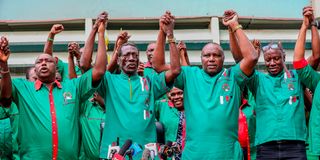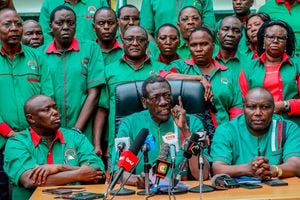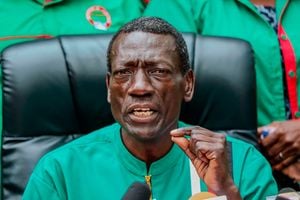
KCSE candidates: Elizabeth Njeri, Fabregas Nyongesa, Tracy Waithera, Idal Patience, Michael Okirin and Brenda Chepkirui urge the government to solve a pay dispute to avert the teachers’ strike.
Candidates for the Kenya Certificate of Secondary Education (KCSE) exam have urged the government to solve a pay dispute to avert the teachers’ strike planned to begin today.
The learners said that failure to end the stalemate will have a negative impact on their preparations for the national tests which will be administered in October.
This year’s KCSE exam class has endured a series of disruptions along the way during critical periods in the course of their studies.
After the first case of Covid-19 was detected in the country on March 13, 2020, the government imposed containment measures to curb the spread of the deadly virus.
Schools were closed for eight months in 2020 and the Kenya Certificate of Primary Education (KCPE) examination was postponed.
After long periods of online learning during the pandemic lockdown, the 2020 KCPE exam class overcame the setbacks to post better results than the 2019 class.
Like other learners, they had to endure a crash programme to recover the lost academic year despite reporting for Form One admission much later than the rest.
And after the normal school calendar resumed in January 2023, there was more bad news for the learners. Floods that caused devastation in most parts of the country early this year once again prompted the authorities to postpone the reopening of schools for the second term. As if that was enough, anti-government protests in June piled more problems for the learners, giving the KCSE candidates a sense of deja vu.
Now, with the KCSE exams scheduled to begin in October, candidates are bracing themselves for another chaotic phase, the same goes for other learners due to sit national tests like the Kenya Primary School Education Assessment (KPSEA) and the Kenya Intermediate Level Education Assessment (KILEA) from October 28 to 31.
KPSEA is administered at Grade 6 before transition to Junior Secondary School (JSS), another level of the new Competency Based Curriculum (CBC) thrown into confusion after government said it has no money to employ JJS intern teachers on permanent and pensionable terms as well as recruit additional tutors.
Interviews with KCSE candidates highlighted their concerns about the disruption the teachers’ strike will have on their crucial revision period, and fears of a possible postponement of the exams.
Those who spoke to the Nation captured the fears shared by 965,501 candidates who will write the exam that will determine their destiny, as it is on the basis of their performance that they will secure placement to university and colleges to pursue courses that will shape their future careers.

Knut officials address journalists at the Union’s headquarters in Nairobi on August 25, 2024 .
Idal Patience, a candidate at Moi Girls School in Nairobi, expressed her growing frustration with the disruptions that have marked her final year of studies in high school.
From devastating floods and anti-tax protests to the potential strike, the challenges have been relentless. With only two months to her final exams, she is worried that any further interruptions will significantly hinder her revision and preparation, undermining the years of effort she and her classmates have invested in their education.
“We've already faced so much—floods, ‘maandamano’, and now the looming strike in the last term of our final year. With just two months left until our exams, any further disruption will severely affect our revision and preparation. We've been working towards this moment for years and it's disheartening to see our hard work threatened by circumstances beyond our control. I am asking our teachers and the TSC to please agree and put the students’ needs first,” Patience pleaded.
Tracey Waithera, a student at Kessup Girls High School, shared similar concerns that the strike and the likely prolonged absence from classes will waste valuable time and hinder their academic progress.
“This strike will not only disrupt our studies but also put our dreams and future at risk. Our entire education has been marred by constant disruptions, and we are the only class ever to endure three long years of interruptions. This is more than just exams for us—it's the culmination of years of hard work and sacrifice. Please, let us finish our exams before more obstacles are thrown in our path,” Waithera pleaded.
Bravin Kiptoo, a candidate at Wareng High School, said with the limited amount of time left to the exams, they are likely to miss out on a lot.
Kiptoo fears that the lack of structured support could leave many students struggling to catch up on their own, potentially affecting their overall performance.
"We already have limited time, so the strike will take us back, something that we are not even ready for. Revision with teachers is more effective than revising alone, and without their guidance, we might overlook important topics," he lamented.
“We've been trying to make up for lost time after the disruption caused by floods. If the teachers’ strike goes ahead, it could slow our momentum, making it even harder to be fully prepared for the exams,” he added.
Fabregas Nyongesa, a Form Four student at Chemilil Academy, said the strike will delay the reopening of schools, which will shorten the time he has to cover unfamiliar material. He worries that this will leave him facing his exams without being fully prepared.
“This situation is causing immense personal stress as I face exams that will determine my future. If teachers go on strike now, I am overwhelmed with fear and anxiety. Why now, at such a crucial moment? The longer we spend time away from school, the slimmer our chances of achieving a good mean score become,” Nyongesa said.
“My heartfelt plea to the teachers is to continue working through this final stretch. We can see the finish line approaching, and after the long journey since Form One, we need their support more than ever. Please, help us finish strong. We will deeply appreciate their sacrifice and be forever be grateful for their dedication,” he added.
Elizabeth Njeri, a candidate at Moi Girls Isinya, said that school provides a conducive environment with access to essential resources like books, laboratory and the library, which are crucial for her studies.
“A strike would significantly impact us. School provides an ideal environment for studying, with easy access to books, labs, and the library. At home, it's challenging to find the time and space to study due to household chores. It would be unfortunate if a strike were to happen, as it would set everything back. While pushing for change is understandable, there should be better measures in place to prevent a strike. We are pleading for a resolution that doesn't involve disrupting our education,” Njeri appealed.
For Brenda Chepkirui, a candidate at Nakuru Girls High School, the fear of an upcoming strike threatens to disrupt the delicate balance she has worked hard to achieve in her studies. Having already endured setbacks during the COVID-19 pandemic and the recent floods, Chepkirui is concerned that her academic performance may once again be severely impacted.
"Personally, my performance was affected immensely after staying out of school during the Covid-19 pandemic, and I struggled a lot to get my studies back in line. The same thing happened during the floods, as my environment at home is not perfect for learning as compared to school,” she explained.
Chepkirui emphasised the challenges of studying at home, noting that the lack of a structured learning environment would make it difficult to stay focused. The looming strike, which could force students to remain at home, has left her anxious.
“I'm afraid the strike will affect me as a candidate. I'm expected to remain at home because of the strike, and I'll have a very hard time studying because of the unconducive environment. I'll have a difficult time settling back into my school routine when we're finally back, and thus, it will affect my performance," she said.
For Michael Okiring of Jan’s Academy, the prospect of a strike is more than just a distant concern—it’s a looming threat with tangible consequences even for him in private school.
“You know, people might assume that private schools are insulated from such disruptions, but that's not the case. If the strike drags on, the likelihood of exams being postponed becomes very high. That’s my fear. We were already hit hard by the pandemic, and this situation is just too much to handle,” Okiring said.
Curtis Murvin of Cheptil High School expressed concern about the severe impact the strike could have on students' academic progress. He urged teachers to reconsider their decision and allow students the necessary time to study effectively.
“The amount of revision that needs to be done is a lot. However, with the threat of a strike, the chances of effectively accomplishing this revision are minimal. At home, it's nearly impossible to study as you would in a structured school environment. Household chores and other distractions make it hard to focus and maintain the discipline needed for proper revision. This situation is not just a temporary inconvenience; it could have long-term effects on our academic performance and future opportunities,” Murvin observed.
Job Musyoka, a candidate at Mbaikini Boys High School, believes that time lost can never be regained, and for him, the strike will significantly impact not only his education but his entire future, which depends on the KCSE exam.
“This strike will affect us negatively. We have a limited amount of time, and any disruption means our revision will suffer. Catching up will be a big challenge, and we won’t be adequately prepared. Our KCPE tests were disrupted; we just want the teachers to return to school so we can complete our studeis,” Musyoka said.
Francis Gitau, a candidate at Jans Academy, said that a strike would disrupt their plans as they have been mentally preparing for the exams. He said that a strike would derail his focus.
“It will disrupt our plans because we have been mentally preparing for the exams. If the strike happens, it will affect our focus and readiness. I am personally prepared, as these exams are crucial for my future. We are frustrated with the constant delays; KCPE was postponed, and we can't afford for KCSE to face the same issues,” Gitau said.
The new Education Cabinet Secretary Julius Migos, who is barely a month old in office, has pleaded with teachers to call off the planned strike. He told head teachers to ensure schools reopen since Sh21.8 billion has been released for third term.
Treasury Cabinet Secretary John Mbadi said that the government is short of funds to give the 46,000 JSS intern teachers permanent jobs, and also recruit 20,000 new teachers as demanded by unions. Mbadi said there is a shortfall of Sh13 billion in the TSC budget.
“There is no money for conversions (of internships to permanent terms) unless we do a budget adjustment, which we do not have space for. This year has been challenging,” Mr Mbadi said on Citizen TV on Thursday night.
Last Friday, the Kenya Union of Post Primary Education Teachers (Kuppet) maintained that the strike set for Monday (today) is still on as planned.
“The strike is on, and the union will continue to mobilise its members to press for their labour rights. The national governing council will convene on August 25 (today), to review developments towards the strike,” Kuppet Secretary-General Akelo Misori said.
“Teachers will attend religious services countrywide for prayers.”









